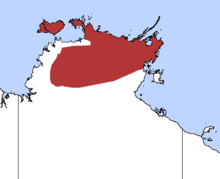Fawn antechinus
The fawn antechinus (Antechinus bellus) is a species of small carnivorous marsupial found in northern Australia. It is the only Antechinus to be found in the Northern Territory and has a patchy, restricted range. Kunwinjku of western Arnhem Land call this animal Mulbu, as they do many rodents [3]. The spelling is given as Mulbbu on the Bininj Kunwok website [4]
| Fawn antechinus[1] | |
|---|---|
| Scientific classification | |
| Kingdom: | Animalia |
| Phylum: | Chordata |
| Class: | Mammalia |
| Infraclass: | Marsupialia |
| Order: | Dasyuromorphia |
| Family: | Dasyuridae |
| Genus: | Antechinus |
| Species: | A. bellus |
| Binomial name | |
| Antechinus bellus (Thomas, 1904) | |
 | |
| Distribution of the fawn antechinus | |
Taxonomy
The earliest collection of a fawn antechinus was made by John T. Tunney,[5] and first described in 1904 by the renowned biologist Oldfield Thomas, who gave it the species name bellus, meaning beautiful.[6] It has never been confused with other species.
It is a member of the family Dasyuridae and of the genus Antechinus (meaning "hedgehog-equivalent"), which has nine other members.
Description
The fawn antechinus is unique among antechinuses, being considerably paler than many of its relatives. It is a light grey colour and is distinguished from the only other similar species in the area where it lives (the sandstone dibbler and the red-cheeked dunnart) by its larger size and paler colouring. It is insectivorous and, like many of its relatives, all of the males die after the breeding season.[7]
The fawn antechinus has a breeding season during August. Young are born in September–October in litters of up to ten, and are usually weaned by January.[7]
Distribution and habitat
The fawn antechinus is found in the Top End of the Northern Territory, where it is fairly common.[6] It inhabits tall, fairly open forest in the tropics.
References
- Groves, C. P. (2005). Wilson, D. E.; Reeder, D. M. (eds.). Mammal Species of the World: A Taxonomic and Geographic Reference (3rd ed.). Baltimore: Johns Hopkins University Press. p. 29. ISBN 0-801-88221-4. OCLC 62265494.
- "IUCN World Conservation congress, 2016". Archived from the original on 8 September 2016. Retrieved 9 September 2016.
- Goodfellow, D. (1993). Fauna of Kakadu and the Top End. Wakefield Press. p. 21. ISBN 1862543062.
- National Environmental Research Program, http://pad.katalyst.com.au/plant_or_animals/various-rock-dwelling-dasyurids, . (2019). Bininj Kunwok. Australian Government.CS1 maint: numeric names: authors list (link)
- Kristofer M. Helgen; Roberto Portela Miguez; James Kohen; Lauren Helgen (2012). "Twentieth century occurrence of the Long-Beaked Echidna Zaglossus bruijnii in the Kimberley region of Australia". ZooKeys. 255: 103–132. doi:10.3897/zookeys.255.3774. PMC 3560862. PMID 23459668.
- Calaby, J.H. (1995). "Fawn Antechinus". In Strahan, Ronald (ed.). The Mammals of Australia. Reed Books. pp. 85–86.
- Menkhorst, Peter (2001). A Field Guide to the Mammals of Australia. Oxford University Press. p. 54.
